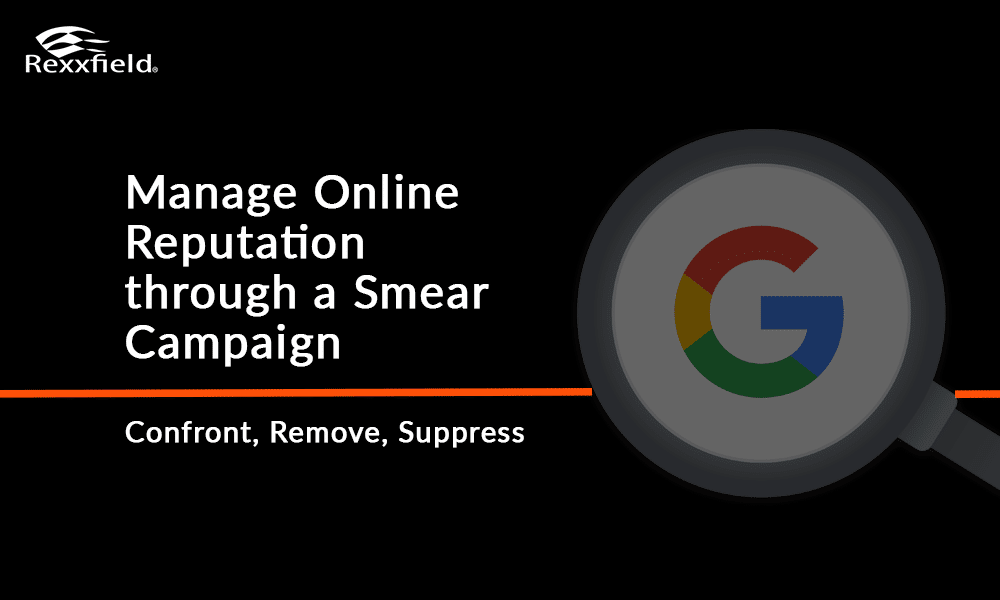In the digital age, where information spreads rapidly across the internet, it is increasingly important to manage online reputation for professionals, and businesses. Your online reputation is the perception others have of you based on the information available online. Whether you are an individual, a business, or a public figure, a positive online reputation can significantly impact your success and credibility. It is easily destroyed by a disgruntled employee, angry client, competitor, or through a malicious smear campaign.
Time, as it always does, will reveal the authenticity of your character.
The Impact of a Damaged Online Reputation Through Smear Campaign
The impact of a damaged online reputation can be devastating for individuals, businesses, and public figures.
Impact on the victim

On top of the impact on personal relationships and isolation, being the victim of online defamation or cyberbullying can take a toll on an individual’s mental and emotional well-being. Constant exposure to negative content and the fear of public judgment can lead to stress, anxiety, and even depression.
In extreme cases, a damaged online reputation may attract online trolls or harassers, resulting in continuous online abuse and bullying. Such situations can escalate quickly and impact an individual’s mental health and overall sense of safety.
Career damage
Employers often conduct online research on job candidates, and negative content may influence hiring decisions. This can be detrimental to career prospects. Similarly, current employees with a tarnished online image may face difficulties in promotions or new opportunities within their organization.
Trust and credibility are essential in both personal and professional relationships. A damaged online reputation can erode trust, as others may question the accuracy and reliability of the information they find about you or your business. This loss of trust can be challenging to recover from.
Business damage
Whether it is B2C or B2B, most people conduct online research or perform at least a Google search before buying from or working with someone. Negative reviews, complaints, or damaging content can deter potential customers and lead to a decrease in sales and revenue.
In some cases, a damaged online reputation may result in legal ramifications. Defamatory statements, false accusations, or harmful content can lead to lawsuits and other legal actions seeking damages for reputational harm.
Identify Internet Trolls
One of the ways to start to manage an online reputation is to identify the individual responsible for the damage. An anonymous internet troll damaging your reputation online can be identified by tracing an IP address. Just tracing an IP address does not directly reveal the identity of the person using that device.
Here are some points to consider when trying to identify an internet troll using an IP address:
Dynamic IP addresses:
Many internet users have dynamic IP addresses, which means their IP address changes each time they connect to the internet. This makes it difficult to link a specific IP address to a particular individual consistently.
VPNs and proxies:
Internet trolls often use virtual private networks (VPNs) or proxy servers to mask their real IP address, making it appear as if they are accessing the internet from a different location.
Shared devices and networks:
Multiple users can share a single IP address, such as in the case of public Wi-Fi networks or households with multiple devices. This makes it harder to pinpoint a specific individual based solely on an IP address.
Legal limitations:
In many jurisdictions, obtaining personal information from an ISP requires a legal process, such as a court order or a subpoena. Without proper authorization, it’s not legal or ethical to try to access someone’s personal information.
If you have the budget, the traced IP address can be followed up with a subpoena to the ISP to obtain the account information to help identify the individual.
However, if you have suspects, we can rule them in or out without the need for a subpoena. By tracing IP addresses, device details, and more, from both the anonymous user and the suspect, we can identify a match or determine someone’s innocence.
Be careful in confronting the troll. Engaging in a public dispute could lead to increased scrutiny and potentially more online attacks.
How to use the evidence to stop the defamation
When you have the evidence in hand, there are several actions you can take to address the situation. First, you can present the evidence. If you do this, the antagonist may stop the harassment voluntarily when they realize that their actions have been documented. Alternatively, if the harassment persists or escalates, involving law enforcement may be necessary. This can result in the police issuing a warning or further investigating the matter.
We specialize in assisting clients with this process, working closely with lawyers to draft the necessary subpoenas effectively. Having dealt with numerous cases involving ISPs, we are well-versed in what information to request and how to formulate the requests properly, ensuring the best chance of obtaining the required information to address the issue at hand.
Manage Online Reputation through Defamation Removal
If you have been able to identify and confront the individual(s) attacking you, they may have removed their defamatory posts. If they have not, or their identity is unknown, there are some ways to manage online reputation.
Contact the Webmaster First
If you come across harmful or undesirable information about yourself on a website that you don’t own, the initial step is to reach out to the webmaster responsible for the site. Politely request the removal of the information, and if they comply by either removing the content or blocking the page from being indexed, you can submit a removal request to Google based on the updated or removed content. Inform Google that the information no longer exists or is outdated, and they will de-index the page accordingly.
It is essential to prioritize contacting the webmaster first because if you only manage to get Google to remove the search result, but the page remains accessible through the website or other search engines, the information can still be found.
Request Google’s Assistance for Removal
Seeking to remove personal results from Google can be challenging, especially for residents of the USA. Google is protected from liability for defamation and libel under Section 230 of the Communications Decency Act in the United States. As a result, Google is not obligated to remove search results even with a court order.
However, if you are from a common law country like Australia, Canada, or the UK, it might be more feasible to get Google to remove negative information from their search results due to different defamation laws in these countries.
We can analyze your specific situation and inform you if removal is possible before proceeding, ensuring transparency and efficiency in the process.
Our analysis is provided free of charge to determine the chance of removal. This ensures that you won’t be charged if removal is not possible.
Removing Google Results through Legal Action
The third option for removing undesirable information from the internet involves pursuing legal action. The most cost-effective approach is to seek injunctive relief from search engines such as Google, Bing, Yahoo, and others. By obtaining a court order, you may be able to have the undesirable search results removed from their engines and indexes.
However, it is essential to be aware that Google, in particular, has been increasingly disregarding court orders. This is because they are shielded by the immunity provided by Section 230 of the Communications Decency Act.
If you successfully obtain a court order, it is crucial to serve it to all relevant search engines. To assist with this process, you can follow our instructions for serving Google, Yahoo, Bing, and other search engines with the court order to ensure its proper execution.
Manage Online Reputation through Information Suppression
If you are unable to have the defaming content removed, the process of suppression may be a more affordable and feasible option.
It is essential to be cautious of anyone promising quick and effortless suppression. Such claims are likely misleading, and the individuals making them may resort to unethical black-hat SEO techniques, leading to penalties and exacerbating the issue in the long run.
The process of suppressing negative information in search results involves convincing Google that positive or neutral content is more relevant and valuable than negative results. By doing so, Google will elevate the preferred content while pushing down the negative search results. However, it is crucial to understand that this process requires consistent effort and patience. It is not a quick fix, and instead of expecting results in weeks, it is safer to consider a timeframe of months. While some cases may show significant improvement within a few weeks, such outcomes are not the norm.
A word of hope
Know that you are not alone in this battle. Reach out to those who stand by your side, your pillars of support. Surround yourself with loved ones who believe in your integrity and character, for their unwavering belief will be your refuge during these times. Time, as it always does, will reveal the authenticity of your character.


